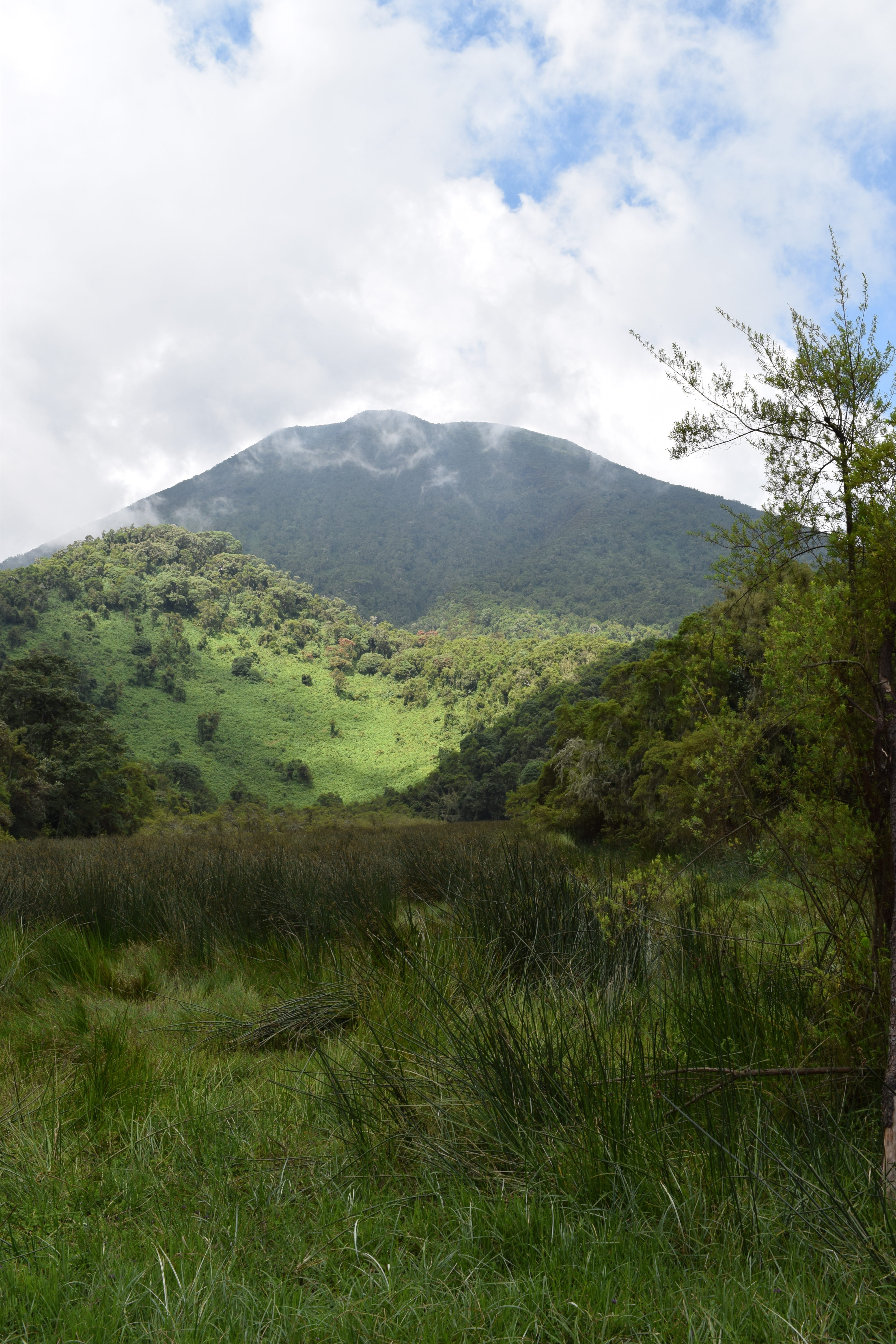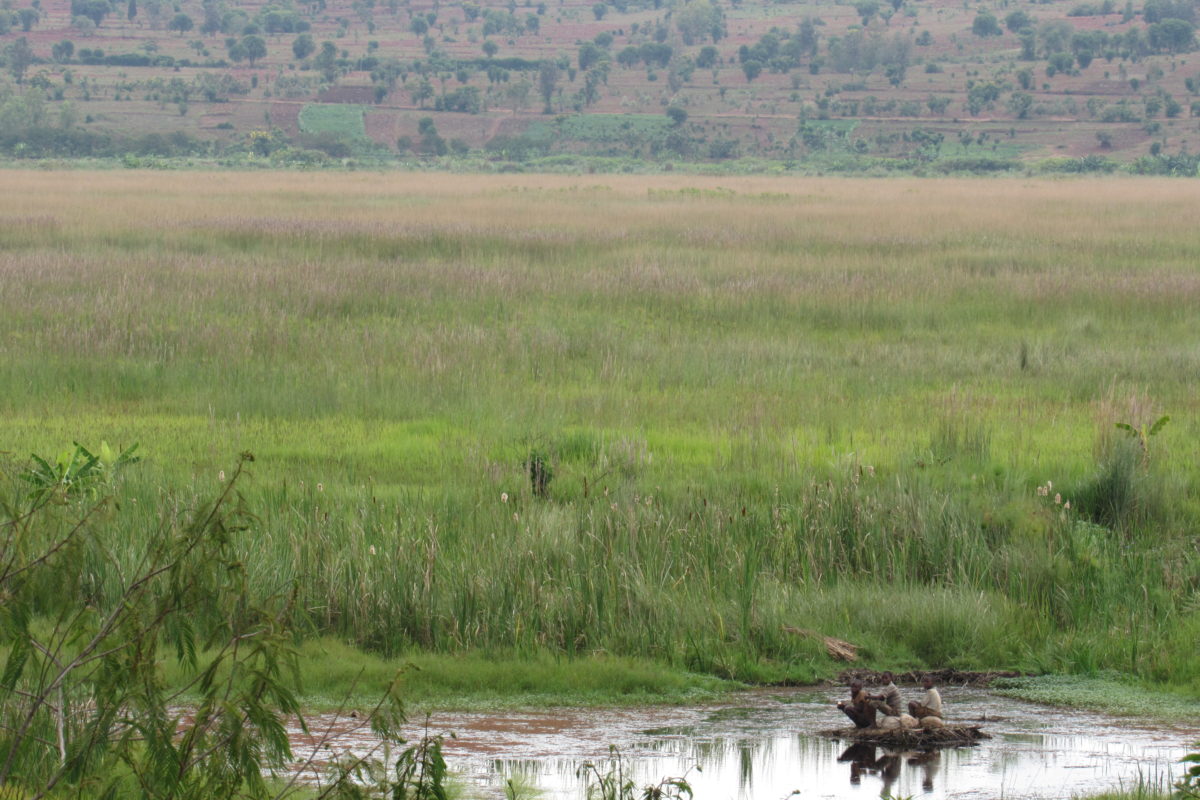SEATTLE, Washington – December 13, 2018 – The JRS Biodiversity Foundation announces two new grant awards, totaling $314,500, to create access to wetlands biodiversity data in Rwanda. These investments support the JRS Freshwater Biodiversity and Resources Program to enable the conservation and sustainable use of freshwater ecosystems.
Rwanda is known for its thousand rolling hills. The hills create watersheds that critically maintain freshwater for the people and wildlife of Rwanda. Rwanda has 860 wetlands, covering a total of 10.6% of national territory. In these watersheds, wetlands provide habitat for wildlife, as well as groundwater replenishment and water purification. Rwanda’s large network of freshwater ecosystems are part of what makes the Albertine Rift a biodiversity hotspot. Wetlands in Rwanda store carbon, and transformation of peatland swamps can release carbon and contribute to global warming. However, Rwanda’s dense population and expanding agricultural landscapes threaten freshwater ecosystems. Improved access to biodiversity data can inform decisions to manage these essential areas for Rwanda.
The two grants announced today address different aspects of freshwater biodiversity information and aim at complementary tools and analyses. The Albertine Rift Conservation Society (ARCOS) and the Center of Excellence in Biodiversity and Natural Resource Management, University of Rwanda (CoEB) will be partners in their respective efforts with each other and Rwanda government agencies to develop national capacity in biodiversity data generation and management.
The Albertine Rift Conservation Society – Using Ecological Integrity Assessment and Advanced Information Management to Guide Wetland Management and Decision-Making in Rwanda, $250,000
ARCOS will conduct an ecological integrity assessment of Rwanda’s wetlands, led by Dr. Samuel Kanyamibwa. The assessment will serve decision-makers by documenting threats to, and opportunities for, preservation of these wetlands. ARCOS received a four-month planning grant from JRS during which ARCOS built partnerships with governmental, academic, and non-governmental organizations to design the assessment and determine data-user needs. In two-year implementation project, ARCOS will upgrade the ARCOS Biodiversity Information Management System (ARBIMS) where the team will publish the biodiversity data locally and to global data repositories.

The Center of Excellence in Biodiversity and Natural Resource Management, University of Rwanda (CoEB) – Planning Phase to Develop a Freshwater Biodiversity Information System for Sustainable Development and Climate Change Adaptation in Rwanda, $64,500.
The CoEB team, led by Dr. Elias Bizuru, will work with data providers and stakeholders to plan a biodiversity information system for Rwanda, focused first on the Mukungwa Watershed. The Mukungwa Watershed includes the Volcanoes National Park and is a priority region due to the presence of rich biodiversity, hydropower stations, and the Rugezi Swamp a peat bog that stores significant carbon. The planning phase will be used to identify key aspects of the biodiversity information system, develop technical capacity, and begin to develop the technology for the system. Through the participatory planning phase, CoEB will develop a full implementation project proposal to be considered for funding in 2019.
JRS is delighted to support two new grants that leverage past JRS projects as well as build partnerships together. In addition to the first phase planning grant, ARCOS received JRS support in 2011 and 2013 to build the ARCOS Biodiversity Information Management System that houses data for the Albertine Rift region. Similarly, CoEB is one of the participants in the JRS supported African Biodiversity Challenge Grant, where they mobilize freshwater biodiversity data to incorporate into a State of Freshwater Biodiversity Report. In addition to partnering with CoEB’s work in the ABC project, ARCOS will also share the biodiversity data they hold for the Mukungwa region. For ARCOS’ project, CoEB will participate in ecological surveys and is tasked to coordinate the national biodiversity data infrastructure. Both organizations are committed to increasing the access to biodiversity information.
JRS believes that decision-makers will conserve biodiversity when there is an understanding of the value of biodiversity, and when there is greater access to high quality, relevant, and accessible biodiversity data. By improving the availability of freshwater species information, ARCOS and CoEB will help to bridge the gap between biodiversity data and conservation.
About the JRS Biodiversity Foundation – The mission of the JRS Biodiversity Foundation is to increase access to and use of information that will lead to greater biodiversity conservation and more sustainable development in Sub-Saharan Africa. Founded in 2004, the JRS Biodiversity Foundation supports the capacity of institutions and people who collect, manage, and disseminate biodiversity data in Sub-Saharan Africa. JRS’ grantees connect this knowledge to stakeholders who make and influence decisions that are crucial to supporting biodiversity. The foundation has awarded $18M in grants since 2007. Visit us online at https://jrsbiodiversity.org.
About ARCOS – The ARCOS network is a registered international NGO, and UK registered charity, established in 1995. ARCOS is a regional conservation organization with the mission to enhance biodiversity conservation and sustainable management of natural resources in the Albertine Rift region, Africa Great Lakes region and African Mountains through the promotion of collaborative conservation actions for nature and people. Visit online at www.arcosnetwork.org/en.
About CoEB – The Center of Excellence in Biodiversity and Natural Resources Management (CoEB) is a knowledge management center consisting of a consortium of governmental and non-governmental environment-related research and higher learning institutions in Rwanda called nodes, coordinated by a central hub located at University of Rwanda (UR). The CoEB supports the understanding, monitoring and cataloguing of biodiversity, and communication and information sharing for effective conservation through science-driven decision making. Visit online at http://coebiodiversity.ur.ac.rw/.
Click here to download an offline copy of this announcement.
JRS Contact Don S. Doering, Executive Director, ddoering@jrsbiodiversity.org, +1(206) 454-7915
Contact at ARCOS: Sam Kanyamibwa, Executive Director, skanyamibwa ‘at sign’ arcosnetwork.org, +250 785 751 900
Contact at CoEB: Elias Bizuru, Professor, ebizuru ‘at sign’ gmail.com, +250 788 576 052

